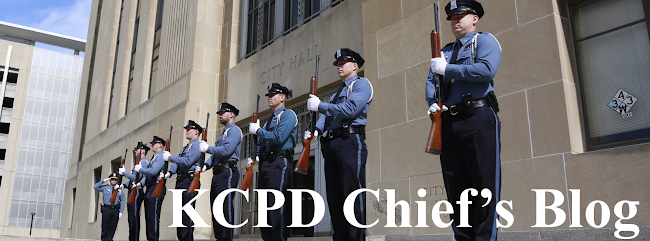I was pleased to be interviewed on Central Standard this week on our local NPR station, KCUR. Gina Kauffman asked some very thoughtful questions. If you didn't get the chance to listen, you can read more about it and hear the full interview online. Below are some of the highlights from our Q & A:
On whether Kansas City is a safe city to live in
Over 50 percent of our homicides occur in less than a 13 square-mile area of the city. So if you look at the other 300 square miles of Kansas City, it's a relatively safe place to live. Most of our crimes are concentrated in our poor neighborhoods, neighborhoods where educational opportunities are not taken advantage of, places with [high] unemployment. We don't need a computer to tell you where the crime is going to be. We can tell you from some of the socioeconomic conditions and things like that. These are places where we've had problems and we'll continue to have problems.
A lot of times it's lifestyle. You know, we have very few random homicides. Most homicides [involve a] victim and suspect that know each other. Often times, they were close associates at one time. So if you're not involved in a high-risk lifestyle, your chances of becoming a homicide victim in Kansas City are slim.
On if more police officers are needed
Of course we can always use more officers. When we talked about the budget cycle for my first two years, I didn't ask for more police personnel. I wanted to make sure we were using the staff we had efficiently and effectively. Now that we're talking about the budget cycle again, I will ask for more because there's some other things we need to do. To me, you could never have too many [officers]. Like we talked about, the response times to the non-priority calls [need to be addressed].
On response times when crimes are reported
We have to prioritize. When we talk about a priority one call, that's a sexual assault in progress, or an aggravated assault where firearms are being used. There's only so many police officers in Kansas City. I think we have to do a better job of educating the public on these things. If you have a burglary and there's no one there and no immediate danger, it may take up to a few hours before a police officer arrives. I understand the victim wants an immediate response, but I think we need to do a better job of sharing some [other crimes] that are going on in the rest of Kansas City so they don't feel disappointed by those high expectations.
How social media is changing police work
I tweet from @ChiefForte. I try to put as much as I can out there. It helps to dispel some things. For example, you hear [people] talk about the Plaza. There might be two 13-year-old girls fighting on the Plaza, and the media says it's a "Junior Riot" the next day. So I go down there and tweet about the two girls fighting because we don't need that negative image on Kansas City.
On faith driving his energy and enthusiasm
My mom raised me to not worry about a lot of things and just know that there is a God. I pray everyday throughout the day. My grandmother is 91 years old, and I talk to her on a regular basis. She always says, "Baby, just keep praying. I don't care what's happening out there."
I don't miss sleep because I'm worried about anything, I miss sleep because my mind is constantly going. I have my iPad with me all the time so when I wake up, I start taking notes. It's think it's just my energy level, I've always been like that since I was a kid. Now that I'm 52, I need at least five hours of sleep. I don't always get it, but if I get five hours of sleep I can run all day.
